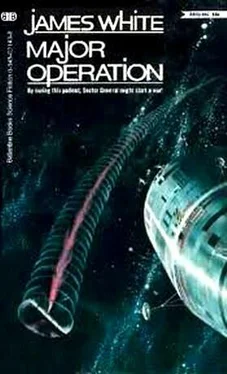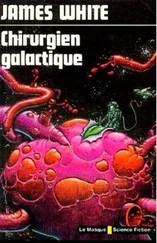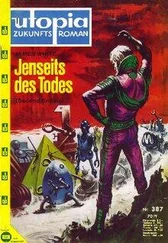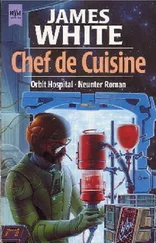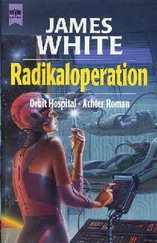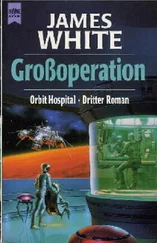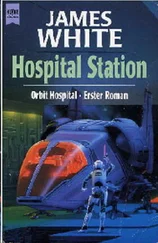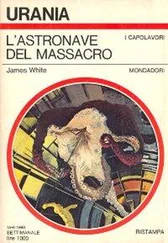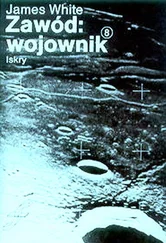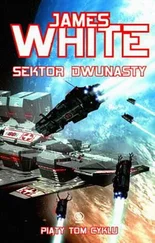Edwards was not available, but his office promised O’Mara that they would have him in a few minutes.
All at once Conway felt like giving up. Lock Fifteen was too far away-a difficult, complicated journey involving three major changes of environment. For their hypothetical invader, who was also a stranger to the hospital, to find its way to this theater would have necessitated it taking mental control of someone and being carried. But if that was the case Prilicla would have detected its presence. Prilicla could detect anything which thought-from the smallest insect to the slow emanations of a mind deeply and totally unconscious. No living thing could shut its mind down completely and still be alive.
Which meant that the invader might not be alive!
A few feet distant Mannon had signaled for a nurse to stand by the pressure cock. A sudden return to Hudlar normal pressure would diminish the violence of any bleeding which might occur, but it would also make it impossible for Mannon to operate without heavy gloves. Not only that, the pressure increase would cause the operative field to subside within the opening, where movement transmitted from the nearby heart would make delicate work impossible. At present, despite the danger of a wrong incision, the complex of blood vessels was distended, separate and relatively motionless.
Suddenly it happened. Bright yellow blood spurted out, so violently that it hit Mannon’s visor with an audible slap. Driven by the patient’s enormous blood pressure and pulse rate the severed vein whipped about like a miniature unheld hose-pipe. Mannon got to it, lost it, tried again. The spurting became a thin, wavering spray and stopped. The nurse at the pressure cock relaxed visibly while the one at Mannon’s side cleaned his visor.
Mannon moved back slightly while the field was sucked clear. Through the visor his eyes glittered oddly in the sweating white mask of his face. Time was important now. Hudlars were tough, but there were limits-they could not stand decompression indefinitely. There would be a gradual movement of body fluid toward the opening in the tegument, a strain on vital organs in the vicinity and an even greater increase in blood pressure. To be successful the operation could not last for much more than thirty minutes and more than half the time had gone merely in opening up the seat of the trouble. Even if the growth was removed, its removal entailed damage to underlying blood vessels which had to be repaired with great care before Mannon withdrew.
They all knew that speed was essential, but to Conway it seemed suddenly as if he was watching a film which was steadily being speeded up. Mannon’s hands were moving faster than Conway had ever seen them move before. And faster still.
“I don’t like this,” said O’Mara harshly. “It looks like he’s regained his confidence, but more likely that he’s ceased caring-about himself, that is. He still cares about the patient, obviously, even though he knows it hasn’t much chance. And the tragic thing about it is that it never did have much chance, Thornnastor tells me. If it hadn’t been for your hypothetical friend’s interference Mannon wouldn’t have worried too much about losing this patient-it would have been one of his very few failures. When he made that first slip it wrecked his self-confidence and now he’s—”
“Something made him slip,” said Conway firmly.
“You’ve tried convincing him of that, with what result?” the psychologist snapped back. He went on, “Prilicla is seriously agitated and its shakes are getting worse by the minute. But Mannon is, or was, a pretty stable type I don’t think he’ll crack until after the operation. Though with these serious, dedicated types whose profession is their whole life it’s hard to say what might happen.”
“Edwards here,” said a new voice. “What is it?”
“Go ahead, Conway,” said the psychologist. “You ask the questions. Right now I’ve other things on my mind.”
The spongy growth had been lifted clear, but a great many small blood vessels had been severed to accomplish this and the job of repairing them would be much more difficult than anything which had gone before. Insinuating the severed ends into the tubing, far enough so that they would not simply squirm out again when circulation was restored, was a difficult, repetitious, nerve-wracking procedure.
There were only eighteen minutes left.
“I remember Harrison well,” the distant Edwards replied when Conway had explained what he wanted to know. “His suit was damaged in the leg section only, so we couldn’t write it off-those things carry a full set of tools and survival gear and are expensive. And naturally we decontaminated it! The regulations expressly state that—”
“It still may have been a carrier of some kind, Major,” Conway said quickly. “How thoroughly did you carry out this decon—”
“Thoroughly,” said the Major, beginning to sound annoyed. “If it was carrying any kind of bug or parasite it is defunct now. The suit together with all its attachments was sterilized with high-pressure steam and irradiated-it went through the same sterilization procedure as your surgical instruments, in fact. Does that satisfy you, Doctor?”
“Yes,” said Conway softly. “Yes indeed.”
He now had the link-up between Meatball and the operating theater, via Harrison’s suit and the sterilization chamber. But that wasn’t all he had. He had Yehudi!
Beside him Mannon had stopped. The surgeon’s hands were trembling as he said desperately, “I need eight pairs of hands, or instruments that can do eight different operations at once. This isn’t going well, Conway. Not well at all …
“Don’t do anything for a minute, Doctor,” Conway said urgently, then began calling out instructions for the nurses to file past him carrying their instrument trays. O’Mara started shouting to know what was going on, but Conway was concentrating too hard to answer him. Then one of the Kelgian nurses made a noise like a foghorn breathing in, the DBLF equivalent of a shriek of surprise, because suddenly there was a medium sized box spanner among the forceps on her tray.
“You won’t believe this,” said Conway joyfully as he carried the- thing-to Mannon and placed it in the surgeon’s hands, “but if you’ll just listen for a minute and then do as I tell you …
Mannon was back at work in less than a minute.
Hesitantly at first, but then with growing confidence and speed, he resumed the delicate repair work. Occasionally he whistled through his teeth or swore luridly, but this was normal behavior for Mannon during a difficult op which was promising to go well. In the observation blister Conway could see the happily scowling, baffled face of the Chief Psychologist and the fragile, spidery body of the empath. Prilicla was still trembling, but very slowly. It was a type of reaction not often seen in a Cinrusskin off its native planet, indicating a nearby source of emotional radiation which was intense and altogether pleasant.
After the operation they had all wanted to question Harrison about Meatball, but before they could do so Conway had first to explain what had happened again to the Lieutenant.
“… And while we still have no idea what they look like,” Conway was saying, “we do know that they are highly intelligent and in their own fashion technically advanced. By that I mean they fashion and use tools …
“Indeed yes,” said Mannon dryly, and the thing in his hand became a metallic sphere, a miniature bust of Beethoven and a set of Tralthan dentures. Since it had become certain that the Hudlar would be another one of Mannon’s successes rather than a failure he had begun to regain his sense of humor.
… But the tool-making stage must have followed a long way after the development of the philosophical sciences,” Conway went on. “The imagination boggles at the conditions in which they evolved. These tools are not designed for manual use, the natives may not possess hands as we know them. But they have minds …
Читать дальше
